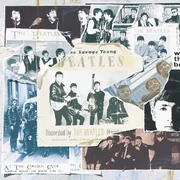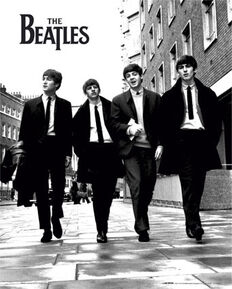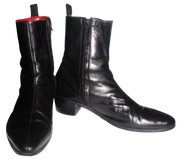 A Good Source For The Beatles Universe And Anything Else Related Welcome To The Beatles Wiki! A wiki founded in 2006 by Vidur about the world's greatest musical act, adopted by Nobody Cares and ListentoMusic in 2010, by Glamra in 2013, KirbyTheBulborb in 2021, and again by BootlegsATrolley in 2024. Ever since 2006, this wiki has given the finest wiki information about The Beatles. And you can help! (Not sure how you can help? Check out this wiki's to-do list.) |
VERY IMPORTANT ANNOUNCEMNET: The Rutles Wiki is moving from the old wiki to a new one due to inactive administration, in other words we are hosting coup against them, so if you are interested please help out by copy and pasting the pages over and reuploaded images.
Beatles News
Featured Song

'I'm Happy Just to Dance with You' is mainly a John Lennon composition (credited to Lennon/McCartney) recorded by The Beatles for the film soundtrack to A Hard Day's Night, and first released on 1 March 1964.
Featured Album
Anthology 1 is a compilation album by The Beatles, released on Apple Records in November 1995. It is the
Featured Article
"I Want to Hold Your Hand" is a song by The Beatles. It is not only the song which introduced The Beatles to America, but also the first song released by the group to be recorded on 4-track machine.
John Lennon and Paul McCartney wrote this in Jane Asher's basement. Asher was an actress who became Paul's first high-profile girlfriend. John Lennon played this song for his friend Gerry Marsden from the band Gerry and the Pacemakers when they were on tour together with The Beatles. Gerry recalled that John came into his hotel room and said played him the newly written song. Marsden thought it was horrible, unaware it would eventually become a hit. "I Want to Hold Your Hand" was perfected by the time the Beatles came to the studio on October 17, 1963 to record it. It was captured in 17 takes, all pretty much performed in the same way. Noticeable differences were on take 2 which tried a hushed vocal line "and when I touch you" and take 4 when Paul sang in mock-American with a pronounced "h" ("shay that shomthing"). The song was played on a Washington, D.C. radio station before it was released in America by a DJ who got the record from a stewardess. It was a huge hit with his listeners. Capitol threatened to seek a court order banning airplay of "I Want to Hold Your Hand," which was already being spread to a couple of DJs in Chicago and St. Louis, until the Beatles appeared on The Ed Sullivan Show. The threat was ignored, and Capitol came to the conclusion that they could well take advantage of the publicity, releasing the single two weeks ahead of schedule on December 26, 1963. Although "I Want to Hold Your Hand" was a #1 hit on both sides of the Atlantic, in America it sold more copies in the first ten days than any other Beatles single sold in the UK. In the first three days, the single had sold a quarter of a million copies.
Did You Know...
- ...that Say Say Say, the duet by Paul McCartney and Michael Jackson, is credited for the introduction of dialogue and storyline into music videos?
- ...that the first song the Beatles recorded was In Spite of All the Danger?
- ...that John Lennon started and ended The Beatles?
- ...that Brian Epstein was gay?
- ...that Paul McCartney and George Harrison were best friends since they met on the school bus in 1954?
- ...that the full interviews of John Lennon, Yoko Ono, and George Harrison are viewable on the Dick Cavett Show page?
- ...that with the addition of the Hey Jude Disambiguation page, the Beatles Wiki became officially 'evil' (666 pages)?
- ...that both Cynthia Lennon and Yoko Ono were older than John?
- ...that John Lennon and Cynthia Lennon had birthdays on consecutive days of the month? (9 October and 10 September, respectively.)
- ...that the above means that their birthdays are 9/10 and 10/9, although which is which depends on which date format you use?
The Beatles

Every record was a shock when it came out. Compared to rabid R&B evangelists like the Rolling Stones, the Beatles arrived sounding like nothing else. They had already absorbed Buddy Holly, the Everly Brothers and Chuck Berry, but they were also writing their own songs. They made writing your own material expected, rather than exceptional. As musicians, the Beatles proved that rock & roll could embrace a limitless variety of harmonies, structures, and sounds; virtually every rock experiment has some precedent on Beatles records. As a unit the Beatles were a synergistic combination: Paul McCartney's melodic bass lines, Ringo Starr's slaphappy no-rolls drumming, George Harrison's rockabilly-style guitar leads, John Lennon's assertive rhythm guitar — and their four fervent voices. As personalities, they defined and incarnated Sixties style: smart, idealistic, playful, irreverent, eclectic. Their music, from the not-so-simple love songs they started with to their later perfectionistic studio extravaganzas, set new standards for both commercial and artistic success in pop.

